- Home
- Gavin Chappell
The Hadrian Legacy Page 10
The Hadrian Legacy Read online
Page 10
He scratched tiredly at his chin. His beard was itching after a week’s growth.
‘I can’t see anything,’ he added. ‘I can’t make out anything, I mean. Nothing fits together. I think I should look for clues north of the Wall.’
‘We have a chance of learning something here,’ Drustica said. ‘Bellomarus has been speaking to me guardedly about the old ways, just as he spoke to you. He hinted at some kind of initiation when we go south.
Flaminius studied her. ‘An initiation? Into the old ways?’
She shrugged. ‘He wasn’t very forthcoming. I didn’t want to ask too many questions.’
‘Very wise.’ Flaminius brushed his horse’s mane. ‘Maybe I should stay here. It’s just that we seem to be moving further and further from the action. When I was in Britain last, Deva was as important a fort as Eboracum, but now the legions are concentrated on the Wall, it must be almost deserted. Hardly the centre of action. But if we can inveigle our way into their cult… we could find out what’s really going on in this province.’
‘Then you’ll stay?’ Drustica asked. ‘I’m glad. I would have had to have gone with you, I couldn’t let you go alone. But I wouldn’t want to become a deserter. I have sworn vows to serve the emperor.’
Flaminius patted her shoulder awkwardly. ‘We serve the emperor in other ways,’ he said. ‘No one could question our loyalty to Rome.’
‘No,’ she said. ‘But maybe you’ll be safer here, with your barbarian enemies, than with the men you thought your friends.’
They went their separate ways, Flaminius to his tent and his bedroll, Drustica no doubt to her duties as an officer.
‘Are you fucking her?’
Flaminius had hardly crawled into the tent when he met the question. He looked up, peering into the stinking gloom at the figure sitting in the darkness. It sounded like Urbogenos. ‘What?’ he demanded.
‘The decurion,’ Urbogenos said. ‘Everyone knows she’s a warrior woman. You’re pretty pally with her. Are you fucking her?’
Jealousy, Flaminius thought. He lay down on his bedroll and turned his face away from his comrade.
‘Of course not,’ he said. ‘Warrior women are all virgins, aren’t they?’ He was guessing; he’d got the idea from the Aeneid, not from any extensive knowledge of druidic culture.
Urbogenos was silent for a while. Just as Flaminius was falling asleep, he heard the man say, ‘When you meet Cucullata, you’ll meet a true woman of the old ways, Gaesorix. Then we’ll see what you’re made of…’
The words came back to him the following morning as they rode south, past Cataractonium’s walls. What could they mean? A woman of the old ways…
The next few days consisted of hard riding and driving rain. From Cataractonium they rode to Eboracum, where their route changed, taking them southwest across the mountains that formed the spine of Brigantia. Britain was prone to rainfall, but the high fells that marked the highest point on the Deva road were hidden in cloud, and the troopers rode through the rain. Flaminius was grateful for the thick woollen scarf that formed part of his auxiliary kit. He felt like a shade, riding forever across the Asphodel Fields in the underworld, as some kind of torment for a misspent life. The rest of the men were no happier, and there was little talking when they pitched their tents at night. He began to think he was wasting his time.
His spirits rose again when they came down into the lowlands again, the sunlit woodlands and lush meadows of the Cornavii country. Rivers snaked sluggishly through good farmland, winding towards the estuaries on the coast. They camped for the night in the ruins of a hillfort. In the morning, Flaminius saw a range of hills on the horizon.
—17—
Deva, June 25
They took to the road again. In a curve of the river, just before it entered an estuary, stood the fortified camp of Deva. Outside the fortress proper was a civilian settlement dominated by a large amphitheatre, and on the riverbank was a port where several ships rose and fell at anchor in the roadstead. Other sails were visible in the estuary, traders going to or from Hibernia.
The fort was dilapidated, half derelict, deserted apart from a few sentries on the walls. Something else seemed to be missing, too, though Flaminius couldn’t quite put his finger on it.
They rode in through the gates to be greeted by silence. The gravel between the barracks blocks was weedgrown, the terracotta tiles of the buildings had fallen in places. After some searching of the camp and the civilian settlement, Marcius Magnus found a tribune sitting with his men in the imperial box of the amphitheatre. The civilian settlement was rundown, inhabited mainly by stray dogs, and the amphitheatre’s seats were less than half filled, although the two gladiatrices who fought down in the arena would have been a draw even at the Colosseum.
‘The legate’s up on the Wall,’ the tribune said apologetically when Marcius Magnus had introduced himself. His name was Priscus. ‘We had no word of your coming.’
‘A message was sent from Eboracum,’ the prefect said peevishly. ‘Did you not receive it?’
The tribune called a clerk down from the cheap seats, a slovenly, half-shaven fellow. ‘Know anything of this?’ he inquired.
‘I’ll consult the records,’ the clerk said, left the amphitheatre heading in the direction of the fort and never returned.
‘Luckily, we’ve no lack of accommodation for you and your riders to station yourselves,’ said the tribune after an awkward moment. ‘You’ll have to do some cleaning out, of course… We’re undermanned here… But in the meantime, enjoy the show.’
Expressing regret, Marcius Magnus declined. After finding stabling for their horses, he led his men to a barracks block near the western wall, overlooking the port.
‘Get all this tidied up,’ he barked, glowering around the dusty, cobwebbed interior, unaware that a long strand of web had somehow attached it to his helmet plume. Hearing men returning to the camp from the amphitheatre, he stamped off to find the officers’ mess, and Drustica took over.
As Flaminius swept up one barracks room, he wondered just how his work for the emperor had brought him to such a backwater. If he had any enemies in the legions, they would never think to look for him here. But where was it all getting him?
The following night, he and some of the other troopers went down to the wine shops by the amphitheatre and drank deeply.
Flaminius’ head whirled with cheap wine and spelt beer, though he had tried to keep a hold on himself. After a while he found himself embroiled in a shouted conversation with Segovesus, who seemed to feel the need to tell him he wasn’t such a bad ’un after all. The noise of the drinking crowd—at night there were quite a few people about—the music from the bards to which half naked dancing girls cavorted inexpertly, the smoke from tarry torches stuck in the wattle and daub walls of the low dive, and the raging of wine in Flaminius’ blood rendered much of the conversation incomprehensible.
‘Shame we can’t go tonight,’ the drunken trooper added in a lull while the harpist retuned his instrument.
‘What was that?’ Flaminius shouted as the music began again. Segovesus shook his head and pointed to his own ear, then shouted something back. Flaminius realised he was saying he couldn’t hear.
Flaminius led Segovesus out into the street down to the amphitheatre. The trooper noisily emptied his bladder into a convenient horse trough. Flaminius leaned against the peeling plaster wall, feeling the cool breeze on his hot face, waiting for Segovesus to finish, then realised his bladder was also full. Segovesus waited politely.
‘What did you want to say?’ Segovesus asked finally, as he tied up the drawstring on his breeches.
Flaminius stared at him. ‘You were trying to tell me something.’
Segovesus shook his head, slapped his fellow trooper on the back and laughed. ‘No, it was you, Gaesorix. You said come out here.’ He looked alarmed. ‘You’re not gonna rob me! I’ll break yer neck first!’
‘What have you got worth robbing?’ Flaminius said.
Segovesus burst out laughing.
‘Sa good un,’ he roared.
‘What did you say to me in there?’ Flaminius said. ‘You said it was a shame we couldn’t go…’
‘I said…’
Segovesus broke off. A crowd of men was coming out of the wine shop. Flaminius recognised men of his barracks, including the quartermaster, Ambicatus, and the ubiquitous Urbogenos. At their head was Bellomarus. Leaning drunkenly against him was a dancing girl from the wine shop. She was laughing wildly at something the optio had said.
Flaminius tried to follow, but Bellomarus thrust out the flat of his hand.
‘Not you,’ he said. ‘You’re not one of us yet. Neither of you is.’
With the dancing girl in their midst, one of them clumsily pouring wine from an amphora into her giggling mouth, they hastened up the road. Flaminius stood staring after them. Muttering, Segovesus stomped back into the wine shop. Flaminius ignored him.
Not one of us yet? What did the optio mean? A thought flashed through his mind. It sobered him as effectively as a faceful of river water. Not one of us yet. He took the serpent’s egg from his belt pouch and fingered it. Anxious, forgetting Segovesus, he hurried down the street after them.
Turning a corner, he was greeted by the amphitheatre, and the slope leading down to the open river. Of the troopers, there was no sign.
The slope came down to the riverbank some way from the camp walls. A few buildings stood on a small hill but for the most part the area was overgrown. Torchlight was moving among the willows on the bend of the river. He started picking his way through the vegetation.
Soon he was lost, forcing his way through stinking undergrowth in almost complete darkness. Behind him the glow from Deva lit up the sky, and he could hear a rumble from both the camp and the civilian settlement. Up ahead, all was dark and silent except for the hissing of the wind among the willows and occasional voices. Shrieks of laughter mingled with a deeper rumble—the dancing girl?
The night sky was clouded and moonless. A bitter wind hit him as he reached the top of the hill. Flaminius caught glimpses of torchlight in the darkness ahead but it seemed to vanish again
He found himself going downhill. From ahead he heard the rushing of water. The ground underfoot was boggy. It came onto rain, mizzling through the moonless sky. He plunged through a stand of willows and his feet sank into stinking mud.
He had come down to the riverside. On the far side of the mud flat, the water flowed past rapidly towards the bend in the river, beyond which were the wharves. On the other bank, he saw one of the quarries that had provided the stone for the rebuilding of the camp. What a waste that had been, now the camp was all but abandoned. The night wind blew, and the moon appeared from behind a cloud. It was full. Its silver light shone down on the river water
At a peal of giggles, he turned. In the moonlit distance was a small knot of torch carrying figures. Flaminius waded back onto the willow grown bank and began forcing his way along the bank, coming out onto a path that led along the bank and then back up the hillside.
Someone stood there, his back to Flaminius, holding a small terracotta lamp and watching the scene. Flaminius froze.
The giggles ended abruptly when the figures thrust one of their number into the water. The victim shrieked shrilly and struggled, trying to wade back out. Hissing in anger, the others forced it back into the deep water. Torchlight glinted on a blade. The victim sank beneath the water. Flaminius glimpsed a dark shape spinning away downstream before it finally sank from sight. Then he flinched back into the shadows when the watcher turned and strode back up the path.
Flaminius saw the man’s face. The light of the lamp transformed it into a hideous mask, but even without this, the expression of exultation was horrifying. It was Marcius Magnus.
The prefect vanished over the hill and darkness fell. Flaminius remembered the unholy delight he had seen on the man’s face when Corvus sacrificed his raven.
Red torchlight illuminated the gloom as the figures walked up from the bank. From the undergrowth, Flaminius watched them pass. He recognised Bellomarus, Urbogenos, and the rest of the troopers.
Of the dancing girl, there was no sign.
—18—
The following day, Dumnorix’s Troop was called out to the parade ground. Tribune Priscus joined an uncomfortable looking Marcius Magnus on the tribunal. He looked frankly round at the gathered men.
‘Now, I’m an easy going fellow,’ he told them in his cut glass Latin, ‘and I realise that everyone needs to unwind. But some things are simply unacceptable.’
He gazed at the assembled ranks and shook his head. Marcius Magnus glanced at him, and said quite audibly, ‘Get to the point, you little fool.’
Tribune Priscus crimsoned and looked as if he was about to strike the prefect. He controlled himself and continued speaking.
This was the most ill-disciplined camp Flaminius had ever known.
‘I’ve had a complaint from a respected member of the civilian community,’ Priscus explained. ‘Now, since most of our cohorts have been absent, and even the legate is on manoeuvres in the north, the civilian community that has grown up to serve our needs as legionaries—or even auxiliaries,’ he conceded, with an ill-judged twinkle, ‘has diminished. So, I think it’s in everyone’s interests to keep happy the few merchants and ship-owners who remain.’
He surveyed the ranks. An ugly murmur ran across the parade ground, going almost indiscernibly from man to man. Tribune Priscus looked terrified, but he plunged on.
‘Veollocatus the merchant,’ he said, ‘who owns the Inn of the Scarlet Lamps, one of the wine shops in the settlement frequented by off-duty legionaries and auxiliaries, came to me in my office earlier with a complaint. One of his girls is missing.’
Flaminius felt sick. He thought he knew what was coming.
Tribune Priscus looked sombrely round at the troopers, who had lapsed into a dangerous silence. ‘For Mercury’s sake, man,’ Marcius Magnus said irritably, ‘the whore’s probably run off. Tell him to report her to the slave catchers and don’t bother my men.’
The tribune looked angry, but ignored the prefect. ‘According to his staff who were on shift last night, the girl in question,’ he consulted his notes and added with an embarrassed cough, ‘one Juliana Meretrix, was seen leaving the establishment in the company of men from this troop. She has not returned to her place of work.’
He favoured the men with a forgiving expression. ‘Now I realise that sometimes… accidents can happen. Men can get… overenthusiastic. After all, the female in question was of a low-class profession. However, this sort of behaviour leads to friction with the civilian authorities, and we don’t really want that. We’re here to keep the peace in this province, not stir up hatred. This whole business will remain under the rose and there will be no official investigation. You can count yourselves lucky! In future I want no such reports. Dismiss.’
Walking back to the barracks, Flaminius fell in step with Drustica.
‘Fool of a tribune should have had a full investigation and executed everyone responsible,’ she growled. ‘The discipline in this place is shocking.’
It was then that Flaminius realised what had been missing from the camp. No crucifixions. All the way up north from Londinium he had seen crucifixions outside all major settlements, civil or military—the legacy of Hadrian, who had settled the province with his favourite tactic of peace through strength. Presumably Deva had been far enough from the action for such methods to be thought unnecessary.
‘No guesses why Tribune Priscus was left behind in base,’ he told Drustica. ‘He’s a few cohorts short of a maniple and no mistake. But I know who the culprits were.’
Drustica studied him with big eyes. In guarded whispers, Flaminius explained what he had seen.
‘They drowned a dancing girl?’ she said when he finished. ‘But why?’
‘Why indeed,’ said Flaminius. ‘And what was our commanding officer doing, lurking about
on the riverbank?’
‘You should report it to Tribune Priscus,’ Drustica said seriously.
Flaminius grimaced. ‘I should, shouldn’t I? As a public-spirited citizen. But I rather think I won’t.’
‘Why not?’ Drustica hissed. ‘That poor girl.’
‘I imagine she’s beyond worrying about,’ Flaminius said, ‘in a better place, or wherever such people go. It’s the whoremaster I feel sorry for—Veollocatus has lost a real money-spinner.’ His expression belied his callous words. ‘But I think this was something more than simple murder. I told you what my fellow trooper had to say.’
‘Not one of us,’ repeated Drustica.
‘Not one of us yet,’ Flaminius corrected her. He halted. They had reached their barracks. ‘I think they sacrificed that girl when they drowned her in the river, though I don’t know who to.’
‘To the goddess,’ said Drustica, as if it was obvious. ‘To the goddess of the river. Deva herself.’
‘But who is Deva?’ he asked her. ‘What is she goddess of?’
‘There is another Deva in my own land, in Brigantia. The river is sacred to the same goddess. Her true name is seldom spoken, but she is goddess of war. My people say that in ancient times, before the coming of the Romans, human beings were cast into her waters at the beginning of any war, as a sacrifice. If the gods received a human sacrifice, the offeror of the sacrifice would not die; the gods would take a life for a life.’
Flaminius shuddered. Abstracted, he looked into the distance. Then his eyes narrowed as he noticed Segovesus watching them from the entrance to the barracks. The moment their eyes met, the Gaul turned away, and slipped inside.
Drustica had also seen him. She turned back to Flaminius. ‘A spy?’
‘There’s a lot of it about,’ Flaminius said. ‘I think we should terminate our little chat. I’ve got duties to perform and I’m sure you have. And we don’t want to attract too much suspicion.’

 The Hadrian Legacy
The Hadrian Legacy On Hadrian's Secret Service
On Hadrian's Secret Service Murder in Hadrian's Villa
Murder in Hadrian's Villa The Sword of Wayland
The Sword of Wayland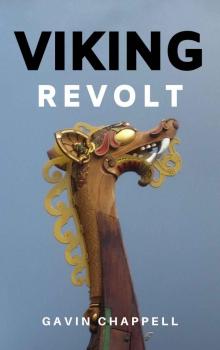 Viking Revolt
Viking Revolt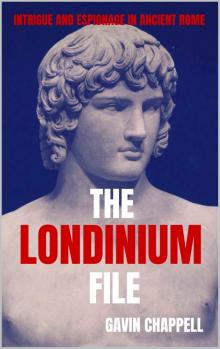 The Londinium File
The Londinium File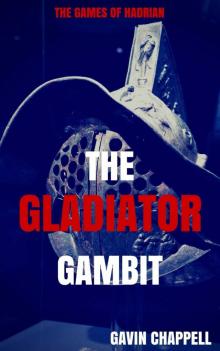 The Gladiator Gambit
The Gladiator Gambit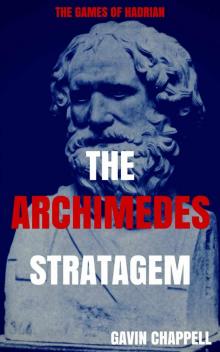 The Archimedes Stratagem
The Archimedes Stratagem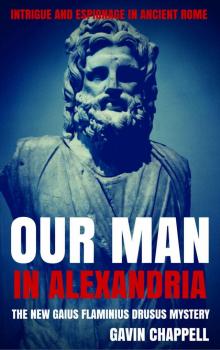 Our Man in Alexandria
Our Man in Alexandria Into the Void (The Dungeoneers)
Into the Void (The Dungeoneers) The Kingdom That Rome Forgot
The Kingdom That Rome Forgot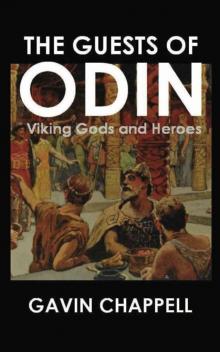 The Guests of Odin
The Guests of Odin